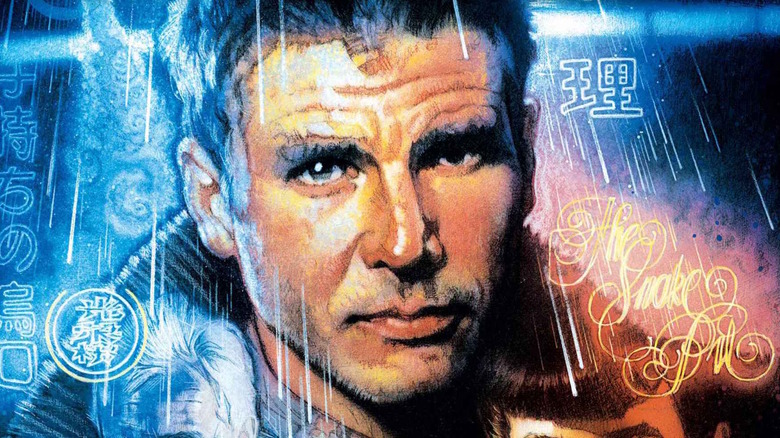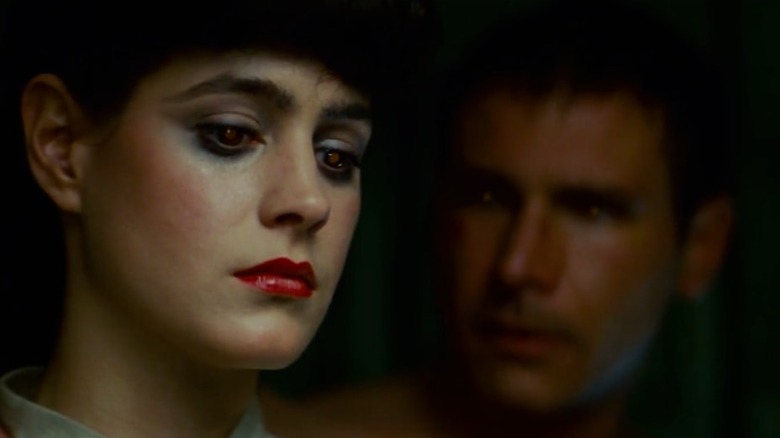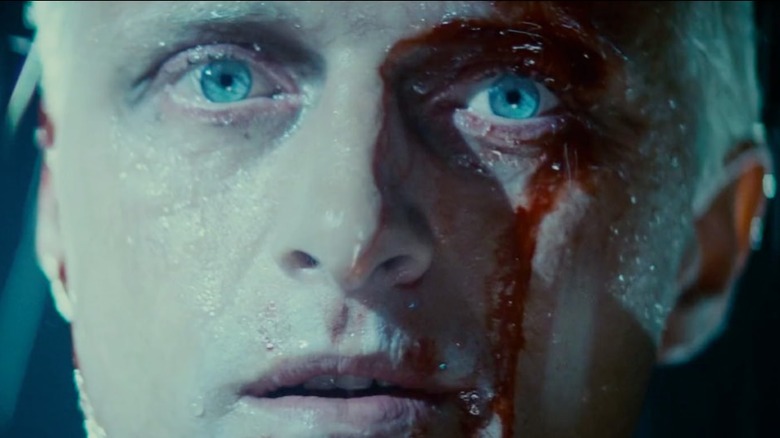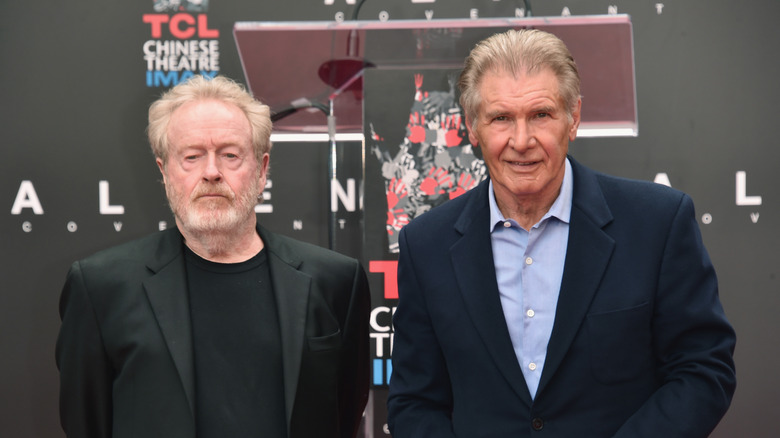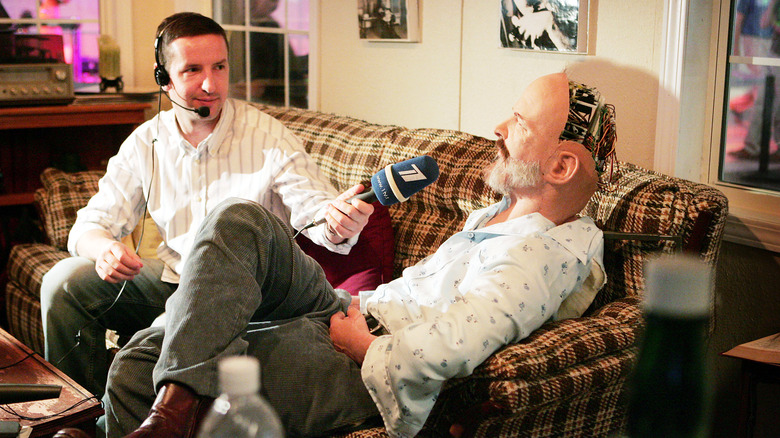The Ending Of Blade Runner Explained
Upon its initial release in 1982, Ridley Scott's tech-noir classic Blade Runner was met with skeptical audiences and empty theaters, thanks in part to a series of slapdash changes made after low test screening scores panicked the studio. Over the years, however, alternative versions more in line with Scott's vision have been released, and the film's popularity has steadily grown. Blade Runner is now considered by many to be one of the famed director's best works—fueling demand for the release of its belated sequel, Blade Runner 2049, in 2017.
Since the release of 1992's Scott-approved "Director's Cut," however, questions about the movie's true meaning have been hotly debated between pretty much anybody who's ever seen the film, resulting in a smoggy smokescreen of confusion which still leaves viewers scratching their heads. But fear not! We're here to help clear the air.
Note: All analysis in this feature is based off 2007's 'Final Cut' version of Blade Runner.
The origami unicorn
Much of the debate surrounding Blade Runner centers on whether the film's replicant-hunting protagonist, Rick Deckard (Harrison Ford), is actually a replicant himself. One main piece of evidence suggesting Deckard's secretly an android comes in the final scene, in which we watch him pick up an origami unicorn made of cigarette foil—disconcerting because, in the "Director's Cut" and "Final Cut" versions of Blade Runner, Deckard dreamed of a unicorn earlier in the film.
We can assume that Eduardo Gaff, the veteran LAPD blade runner and origami maker who orders Deckard around, made the unicorn in question, since origami is kind of his thing. But how could he know the contents of Deckard's dreams? Given Deckard's rather reserved nature, it's hard to imagine he would have told Gaff he dreams about mythical horned horses commonly associated with little girls' fantasies.
There's only one way Gaff could possibly know about the blade runner's dream unicorn: Deckard must be a replicant. Gaff must have read Deckard's memory file—just as we know Deckard read the contents of Rachael's. Director Ridley Scott even confirmed this in Deck-A-Rep: The True Nature of Rick Deckard, stating: "How would anyone have known what was inside his head other than someone who knew what was in his file, that had been implanted in his brain? Can't be any clearer than that."
In fact, Scott's rather testy about the whole question of whether Deckard is a replicant, claiming: "If you don't get it, you're a moron."
Why is Gaff always creepin'?
The tin-foil unicorn brings us to the second piece of evidence supporting the theory that Rick Deckard is actually a replicant: Eduardo Gaff—himself a veteran blade runner—follows Deckard everywhere.
And we mean everywhere. Who delivers Deckard's LAPD summons at a dirty noodle bar in some poorly-pronounced variant of Hungarian-language street lingo? Gaff. Who creeps up behind the booze-buying Deckard as soon as he retires the first of his assigned targets? Gaff. Who shows up immediately after the dominant Nexus 6 replicant Roy Batty empties the contents of his soul in the pouring rain? Gaff. Who leaves Deckard previous little origami gifts in secret? Gaff. Get the picture?
It's clear that Gaff has something of a thing for our protagonist, but why? Perhaps the most plausible theory is that the LAPD veteran is tasked with monitoring Deckard. But why would a "one-man slaughterhouse" like Deckard need a leash? Because he's a replicant, that's why—one that's simply unaware he isn't human, much like the film's femme fatale, Rachael.
What better way to eradicate stronger, faster, and more powerful humanoid robots than to have another more advanced replicant like Rick Deckard do the dirty work? Gaff just has to sit back and make sure things don't get out of hand. After all, the last thing the LAPD would need is for Deckard to figure things out, go AWOL, and start causing some real trouble.
You've done a man's job, sir!
In addition to following our protagonist around, Eduardo Gaff also drops another major hint that the titular blade runner might not be human after all.
After Deckard climactically retires the advanced Nexus 6 Roy Batty—or, rather, is surprisingly saved by Roy and forced to watch Batty succumb to fatal obsolescence—Gaff immediately shows up and drops some compensation at Deckard's feet. But that's not all he drops. Gaff also delivers one of the most dissected lines in the film's history when he tells Deckard: "You've done a man's job, sir!" What does he mean?
It's entirely possible that Gaff is merely commending Deckard on a job well done. However, who can deny that there's something awfully fishy about his specific choice of words? It's almost as if he's leaving out the second part of his thought, which might be something along the lines of: "But are you sure you are a man? It's hard to tell who's who around here." In fact, those exact lines were allegedly cut from the original script—which would all but assuredly give Deckard's true identity away.
Perhaps it's reading a bit too far into a single phrase, but given everything we already know about Gaff, it seems there's more to his final lines than meets the eye.
Eye spy with my replicant eye...
Speaking of eyes, the set of ocular orbs given to Nexus 6 replicants—as well as Tyrell's fake owl—frequently gives away their non-human nature. When hit with the just right light, a replicant's eyes give off a certain glow not entirely dissimilar to that redeye effect you remove from your photographs before posting them to Facebook. This makes it obvious who's what in Ridley Scott's future noir classic...except, of course, when it's applied to Rick Deckard.
Roughly an hour into the film, after Rachael saves Deckard and they're both back in the blade runner's apartment, she asks him whether he'd come after her if she were to run away somewhere and disappear. While putting forth this question, Rachael's eyes give off that patented replicant glow multiple times. Deckard walks behind her and responds with a negative, but—ever so briefly—we can see his eyes give off the same glow.
This split second of a nearly two-hour-long film has thrown fuel on the the "Deckard isn't human" fire for decades. Given the nature of the moment, with the eerie music underscoring Deckard's ominous "but somebody would," it's definitely not outside the realm of possibility that his eyes are giving him away.
He takes a lickin' and keeps on tickin'
The last major piece of evidence suggesting Deckard isn't a human is tough to overlook. Anyone who's even passively watched the film has surely noticed that the blade runner gets his ass thoroughly kicked multiple times throughout the story, yet seems to heal almost immediately. Everyone knows Harrison Ford is a badass, but either he's even stronger than we all thought, or Deckard is an android.
Let's look at the fights in question. First, Deckard gets roughed up and choked out by Zhora, the first replicant he retires, but is still able to chase her down. Then he gets slammed around by Leon, who tosses him through a windshield. Later, Deckard ends up in a thigh-clamp headlock courtesy of Pris, who tried and failed to break his neck and rip off his nose. He then has his fingers dislocated by Roy, but rather easily relocates them and still manages to climb on buildings. All in all, Deckard remains largely unscathed during his successful Nexus 6 manhunt. "A man's job?" Yeah...right.
Given the fact that Nexus 6 replicants are significantly stronger than their creators and can crush human skulls like overripe cantaloupe, it's astounding that Deckard could survive Pris' attempt at decapitation and de-nose-ification—unless, of course, he's a replicant. What else could possibly match up against Los Angeles' four most dangerous on-the-loose androids? Either Deckard's just one hard dude, or he's a replicant himself—perhaps even a more advanced Nexus 7?
Blood brothers
Some viewers also believe that Roy Batty's decision to save Deckard at the film's climax, rather than let him fall to his death, indicates a recognition of kinship between the two replicants. However, this crucial moment is far less about Deckard's nature than it is about his quarry's.
"It was an endorsement in a way, that [Roy Batty] is almost more human than human, in that he can demonstrate a very human quality at a time when the roles are reversed and Deckard may have been delighted to blow his head off," Ridley Scott explained. "But Roy Batty takes the humane route. But also in a way, because he wants a kind of death watch, where he knows he is going, dying. So in a sense he is saving Deckard for something, to pass on the information that what the makers are doing is wrong—either the answer is not to make them at all, or deal with them as human beings. Obviously there are parallels to Apartheid and all sorts of things."
This moment also provides a minor clue that Deckard may not be a replicant, in that Batty informs his hunter that he's "seen things you people wouldn't believe." If Batty recognized the blade runner as a closet replicant, it's highly unlikely the android would have chosen to refer to Deckard as a member of the human race—unless, of course, he'd learned sarcasm.
Ridley Scott had an answer...
After mulling over Blade Runner's final scene and examining all the evidence, the next logical step in our quest to uncover Rick Deckard's true nature would be to ask the film's director, Ridley Scott. Luckily, he has a definitive answer.
In an interview with Wired, Scott made the bold claim that his intention was to always have Deckard be a replicant, despite what anyone else thinks. "That's the whole point of Gaff, the guy who makes origami and leaves little matchstick figures around," Scott explained. "He doesn't like Deckard, and we don't really know why. If you take for granted for a moment that, let's say, Deckard is a Nexus 7, he probably has an unknown life span and therefore is starting to get awfully human."
So there you have it. If the director said Deckard's a replicant, he's a replicant ... right? Well, not quite. You see, not everyone involved in the film's production agrees.
...But Harrison Ford disagrees
Scott may say Rick Deckard is a replicant, has always been a replicant, and will always be a replicant, but not everyone agrees — including the man who plays Deckard.
Harrison Ford never bought Scott's theory that the titular blade runner was an android, despite what the director says. In fact, Ford claims he and Scott were always at odds over Deckard's true nature. "That was the main area of contention between Ridley and myself at the time," Ford said in an interview with BBC1. "I thought the audience deserved one human being on the screen that they could establish an emotional relationship with. I thought I had won agreement to that, but in fact, I think he had a little reservation about that. I think he really wanted to have it both ways." With the original version of the film clearly illustrating Deckard as a human, and with subsequent versions suggesting exactly the opposite, it seems Scott did ultimately have it both ways.
So, who are we to believe? The director says Deckard is a replicant, and the man behind Deckard himself says he's a human—but can we really take the actor's word for it? After all, the character Ford portrays also believes he's human...at least for the majority of the film. Perhaps Scott was pulling the wool over Ford's eyes the whole time. The director is the boss, after all.
The producer weighs in
Blade Runner's producer, Michael Deeley, sides with Harrison Ford when it comes to the Deckard-as-a-replicant debate, claiming that Deckard was never supposed to be a replicant.
In an interview with The MALESTROM, Deeley claimed Deckard was always intended to be human—just a more somber, morose human in the vein of classic film noir. In describing Ford's performance, Deeley said, "Well, of course there was the looming issue of here's an actor that wants to be playing in a classic style, which he did, like the early American detective films, that sort of feeling. Subsequently of course, it's argued that he is... a replicant! But that's the theory that I know was never in the original concept ... it was developed. Actually, Ridley developed it... he decided this was a great twist but it was never permitted to be part of the [original version]."
Furthermore, Deeley thinks Ridley's twist is just plain stupid. In Paul M. Sammon's book Future Noir: The Making of Blade Runner, the producer doesn't hold back: "I never thought Deckard was a replicant, either. That was just a bit of bulls***, a little extra layer Ridley put in. Also an obfuscation. Not only did I never believe Deckard was a replicant, I also thought it futile to try and make him one. Harrison resisted the idea, too. But that was Ridley's pet theory, even if it didn't make sense. Why would you do that? Deckard would be the first replicant you'd knock off if you were getting rid of them. Anyway, just because you say, 'Wouldn't it be funny if Deckard was an android?' doesn't necessarily make it so."
What did the author think?
Of course, if you really want to know whether or not Rick Deckard is a replicant, it would make sense to see what Philip K. Dick—the author of Blade Runner's inspiration, Do Androids Dream of Electric Sheep?—had to say on the matter.
Dick passed away the same year Blade Runner hit theaters, and he never got to see the finished product. Still, according to Dick, the story's protagonist is definitely not a replicant. At least, not in the literal sense. Rather, the similarities between Deckard and the replicants he retires—i.e. his toughness, his emotionally muted personality, the way his eyes glow when hit by just the right light—serve to blur the lines between human and android. "The purpose of this story as I saw it was that in his job of hunting and killing these replicants, Deckard becomes progressively dehumanized," Dick explained. "At the same time, the replicants are being perceived as becoming more human. Finally, Deckard must question what he is doing, and really what is the essential difference between him and them? And, to take it one step further, who is he if there is no real difference?"
And that, dear readers, is ultimately the point...
Does it really matter?
We can argue all we want about whether Eduardo Gaff knows the contents of Rick Deckard's dream, or whether Deckard's durability stems from him being some variation of the Nexus model, or whether the split second his retinas reflect light indicates that his eyes were manufactured in a laboratory... but does it really matter? And does it really matter that Ridley Scott always intended Deckard to be a replicant? The rather obvious answer is a resounding: "No."
Blade Runner's themes run much deeper than simply arguing about the literal nature of its protagonist. Rather than fight over whether Deckard is an android, we're all supposed to question the difference between the blade runner and the replicants he's tasked with disposing of. The film forces us to question what it really means to exist in a bleak near-future of industrial smog, Coca-Cola advertisements, and loneliness. It makes us examine the nature of humanity when robots like Roy Batty are capable of showing more empathy than their creators. It asks us to question the very purpose of life when all of our memories "will be lost in time like tears in the rain."
Finally, Blade Runner reminds us that we'll all die, someday, and to live in fear is to be a slave—replicant or not.
